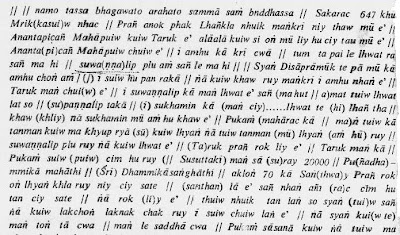This is a glowing review of Gordon Luce's Old Burmese word list written by emeritus professor of Tibeto Burman linguistics, James Matisoff at UC Berkeley:
"The great South-East Asian Linguist and epigrapher, Gordon H. Luce, devoted many decades of his long life to the decipherment and analysis of the inscriptions of Old Burma. He had long intended to draw on the unparalleled wealth of materials in his files to produce a comparative lexicon of prestandard Old Burmese ' (OB). As Professor Henderson explains in her moving introduction, Luce's advancing years and failing eyesight caused A comparative word-list of Old Burmese, Chinese and Tibetan (CWL) to be less ambitious in scope or polished in format than Luce would have wished. Even so, the CWL is a mine of fascinating comparative material, not only for OB, where Luce's first-hand expertise was second to none, but also for Archaic Chinese (AC) and Written Tibetan (WT), where he had to rely for his data on Karlgren's reconstructions and Jäschke's dictionary.This work remains to be done. Luce's word list is essentially a partially completed dictionary of Burmese epigraphy.
The CWL consists of a list of some 1,340 items from the basic Sino Tibetan Burmese vocabulary'. (These are not numbered consecutively, which probably accounts for Henderson's too low estimate of `800', p. 1.) The list is arranged according to the rhyme of the Burmese form...Each item on the list extends horizontally across five columns, containing (1) an English gloss ; (2) a romanized transcription of the Written Burmese (WB) form ; 3 (3) passages from OB inscriptions (largely from the twelfth century) illustrating the syntactic and semantic contexts in which the word occurred ; (4) a Chinese character whose meaning and reconstructed Archaic pronunciation suggest a plausible relationship to the Burmese form ; and (5) a romanized transcription of a similarly suggestive form from Written Tibetan.
Potentially the most valuable information in the CWL is to be found in Column III, which constitutes a veritable concordance of the core vocabulary of the early OB inscriptions. Each passage cited is carefully indexed to the particular inscription in which it appears. Everything is in Luce's own small, precise handwriting, and the user of this concordance will find a magnifying glass helpful. More serious is the total absence of any translations of the OB passages cited. While this will not hamper Chose whose Old Burmese comes naturally, for the rest of us an important dimension of this work remains largely inaccessible...
Luce did not bother to indicate which words in the OB texts correspond to the modern orthographic (= WB) forms in the second column. While this is usually obvious enough, it would have been useful to show this by underlining."



















